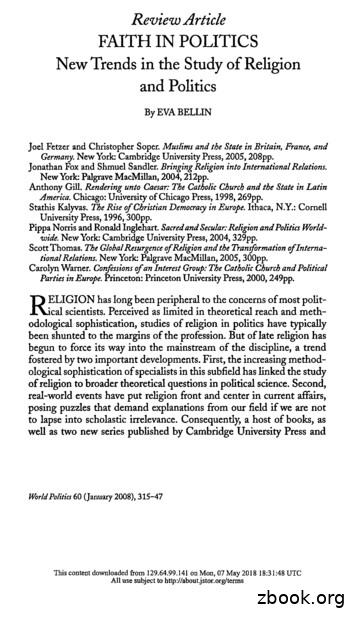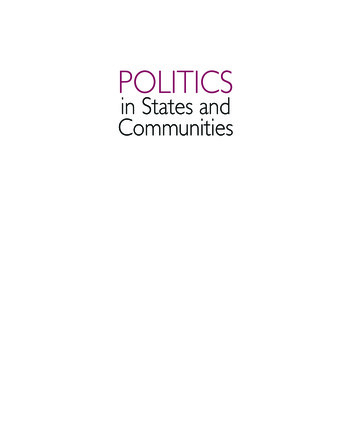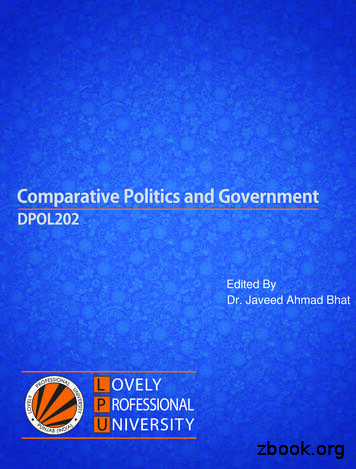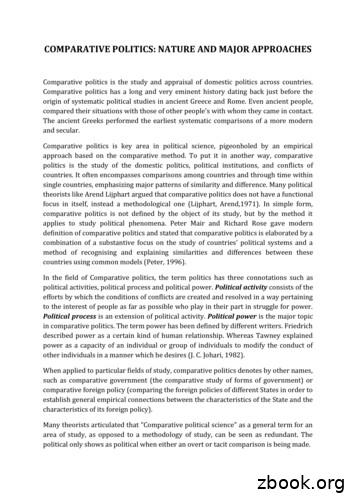What Is Politics?
Chapter 1What is Politics?1
‘Man by nature a political animal’.Aristotle Politics, 1. Politics exists because people disagree. For Aristotle, politics is ‘nothing less thanthe activity through which human beingsattempt to improve their lives and createthe Good Society. Politics is a socialactivity. It is always a dialogue, and nevera monologue.2
Defining politics Politics in its broadest sense, is theactivity through which people make,preserve and amend the general rulesunder which they live. Politics is inextricably linked to thephenomena of conflict and cooperation.3
On the one hand, the existence of rivalopinions, different wants, competingneeds and opposing interests guaranteesdisagreement about the rules under whichpeople live. On the other hand, people recognise thatin order to influence these rules or ensurethat they are upheld, they must work withothers.4
Two major problems on clarifying themeaning of politics.1. Few people come to politics withoutpreconceptions. Many automaticallyassume that students and teachers ofpolitics must in some way be biased,finding it difficult to believe that thesubject can be approached in an impartialand dispassionate manner.5
2. Politics is defined in such different ways asthe exercise of power, the exercise ofauthority, the making of collective decisions,the allocation of scarce resources, thepractice of deception and manipulation, andso on. Politics may be treated as a essentiallycontested concept in the sense that theterm has a number of acceptable orlegitimate meanings.6
The different views of politics examinedhere are as follows. Politics as the art of government Politics as public affairs Politics as compromise and consensus. Politics as power and the distribution ofresources.7
Politics as the art of government ‘Politics is not a science but anart’.Chancellor Bismarck The art Bismarck had in mindwas the art of government, theexercise of control within societythrough the making andenforcement of collectivedecisions.8
US political scientist David Easton definespolitics as the ‘authoritative allocation ofvalues’. By this he means that politicsencompasses the various processesthrough which government responds topressures from the larger society, inparticular by allocating benefits, rewardsor penalties. ‘Authoritative values’ aretherefore ones that are widely accepted insociety, and are considered binding by themass of citizens.9
Politics is what takes place within apolity, a system of social organisationcentred upon the machinery ofgovernment. Politics is thereforepractised in cabinet rooms, legislativechambers, government departments andthe like, and it is engaged in by a limitedand specific group of people, notablypoliticians, civil servants and lobbyists.10
Cabinet Office11
British Cabinet Room12
Governance Governance is a broader term than government. Althoughit still has no settled or agreed definition, it refers, in itswidest sense, to the various ways through which sociallife is coordinated. Government can therefore be seen asone of the institutions involved in governance. It ispossible to have governance without government. The principal modes of governance are markets,hierarchies and networks. The wider use of the termreflects a blurring of the state/society distinction, resultingfrom changes such as the development of new forms ofpublic management, the growth of public-privatepartnerships, the increasing importance of policynetworks, and the greater impact of both supranationaland sub-national organisations.13
Politics as Public Affairs A second broader conception of politicsmoves it beyond the narrow realm ofgovernment to what is thought of as‘public life’ or ‘public affairs’. Where should the line between ‘public’ lifeand ‘private’ life be drawn? The traditionaldistinction between the state and civilsociety.14
Two views of the public/private dividePublicThe state:apparatus ofgovernmentPrivateCivil society: autonomous bodies:businesses, trade unions, clubs,families, and so onPublicPublic realm: politics,commerce, work, art,culture, and so onPrivatePersonal realm:family and domesticlife15
Politics as Compromise and Consensus The third conception of politics relates notso much to the arena within which politicsis conducted as to the way in whichdecisions are made. Specifically, politics isseen as a particular means of resolvingconflict: that is, by compromise,conciliation and negotiation, rather thanthrough force and naked power. This is what is implied when politics isportrayed as ‘the art of the possible’.16
Politics as Power Power in its broadest sense, is the abilityto achieve a desired outcome, and it issometimes referred to in terms of thepower to do something. In politics, power is usually thought of asa relationship: that is, as the ability toinfluence the behaviour of others in amanner not of their choosing.17
Approaches to the study of politics The philosophical tradition(perspective/normative)This involves the analytical study of ideas anddoctrines that have been central to politicalthought. Most commonly, it has taken the formof a history of political thought that focuses on acollection of ‘major’ thinkers (that spans, e.g.Plato to Marx) and a canon of ‘classic’ texts.The ‘normative’ approach is ‘prescriptive’ in thesense that it makes judgements and offersrecommendations.18
The empirical traditionThe empirical approach to political analysisis characterised by the attempt to offer adispassionate and impartial account ofpolitical reality.The approach is ‘descriptive’ in that itseeks to analyse and explain.19
The scientific tradition- Objective and quantifiable data againstwhich hypotheses could be tested.- concepts such as ‘liberty’, ‘equality’,‘justice’ and ‘rights’ are sometimesdiscarded as being meaningless becausethey are not empirically verifiable entities.20
Recent developments- Amongst recent theoretical approaches topolitics is what is called formal political theory,variously known as ‘political economy’, ‘publicchoice theory’ and ‘rational-choice theory’.- This approach to analysis draws heavily uponthe example of economic theory in building upmodels based upon procedural rules, usuallyabout the rationally self-interested behaviour ofthe individuals involved.21
Can the study of politics bescientific?Three difficulties:1. The problem of data.2. The existence of hidden values.3. The myth of neutrality in the socialscience.22
Concepts, models and theories A concept is a general idea aboutsomething, usually expressed in a singleword or a short phrase. A concept is morethan a proper noun or the name of a thing. Models and theories are broader thanconcepts; they comprise a range of ideasrather than a single idea. The purpose of a model is to resemble theoriginal object as faithfully as possible.23
Conceptual models are analytical tools; their valueis that they are devices through which meaning canbe imposed upon what would otherwise be abewildering and disorganised collection of facts. It is vital to remember that conceptual models areat best simplifications of the reality they seek toexplain. The terms theory and model are often usedinterchangeably in politics. Theories and modelsare both conceptual constructs used as tools ofpolitical analysis.24
The Political System modelby David Easton ntOutputs25
Levels of Conceptual Analysis26
Politics exists because people disagree. For Aristotle, politics is ‘nothing less than the activity through which human beings attempt to improve their lives and create the Good Society. Politics is a social activity. It is always a dialogue, and never a monologue.
various facets of politics — the Indian Constitution, politics in India, and political theory. Contemporary World Politics enlar ges the scope of politics to the world stage. The new Political Science syllabus has finally given space to world politics. This is a vital development. As India becomes more prominent in international politics and as
WORLD POLITICS . Palgrave Macmillan, have been devoted to the study of religion in com parative and international politics. 1 . The renaissance in this subfield has led to important advances in our understanding of religion in politics, although notable lacunae remain. In . comparative politics, the subfield's turn from purely descriptive work
Local Politics: Institutions and Reform, 4th ed (2014). I have taught graduate seminars on State Politics, American Political Parties, The Politics of Direct Democracy, The Politics of Campaign Finance, and The Politics of Reform, and I also regularly teach a large undergraduate survey course, State and Local Politics.
What is Politics? CHAPTER OVERVIEW This initial chapter introduces and defines politics and applies it to America's government. In Lasswell's famous definition, politics is "the process of who gets what, when, and how." In other words, the text's definition of politics "centers on actions among a number of people
UP CLoSE: Getting into Politics 90 RAnkingS of ThE STATES: Voter turnout Rate: 2012 Presidential Election 93 Continuing Election Controversies 96 Race, Ethnicity, and Political Participation 100 Securing the Right to Vote 102 Minorities in State Politics 105 Women in State Politics 108 Young and Old in State Politics 110
Politics 121 is not a prerequisite for Politics 122. 124 Introduction to Politics and the Environment Spring Brick 4 credits An introduction to key concepts in the study of politics using environmental issues as illustrations. Designed for first- and second-year students, this course encourages critical thinking and writing about such political .
1.1 Definition, Meaning, Nature and Scope of Comparative Politics 1.2 Development of Comparative Politics 1.3 Comparative Politics and Comparative Government 1.4 Summary 1.5 Key-Words 1.6 Review Questions 1.7 Further Readings Objectives After studying this unit students will be able to: Explain the definition of Comparative Politics.
comparative Politics can be defined as the subject that compare the political systems in various parts of the globe, with a view to comprehend and define the nature of politics and to devise a scientific theory of politics. Some popular definitions of comparative politics are given below:























